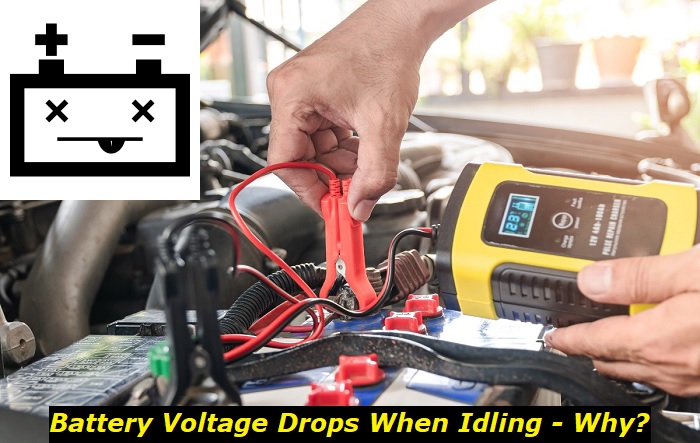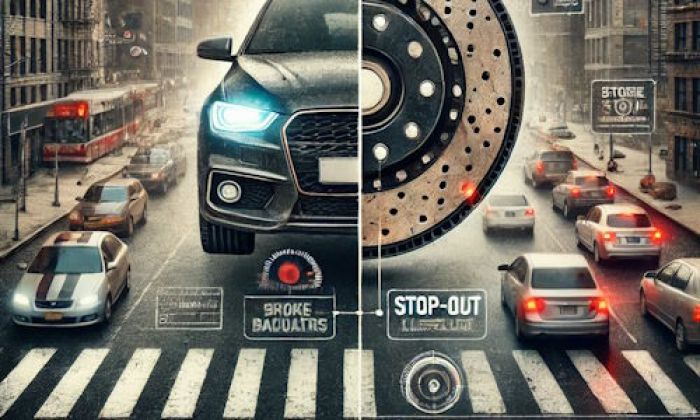The battery voltage may drop when your engine is idling because of a dying alternator, bad voltage regulator, dying battery, or some problems with connections and wiring. Normally, the battery voltage should go up once the engine is started because, in this situation, the alternator takes over all the work in the electrical system and even charges the battery.
Car battery issues highlights
- Possible reasons:battery age, driving conditions, drains, long sitting, electrical problems
- Types affected:all types
- Average age:4-5 years
- Most commonissues:low voltage, no crank, battery light, glitchy electronics
- Can you drive?only if it starts
- DIY fix:possible
- How much to fix?$150 - $250

How to check if the battery voltage really drops?
It's not that easy to understand what happens with the battery voltage after you start the engine. You will need a multimeter and some understanding of how to use it to check this.
Very often, people report battery voltage dropping because their lights go dimmer in the car or the engine works harshly and almost stalls. But there are other reasons for this, it's certainly not about the battery voltage.
So, here's how you can understand that the battery voltage drops in your vehicle when the engine is idling:
- check the voltage of the battery when the engine is off - it should say 12.2 to 12.7 volts, usually;
- then start the engine, let it idle for some seconds, and check the voltage on the battery terminals;
- in this case, you should see over 13 volts because the alternator starts charging the battery;
- if the voltage is still 12 volts or even lower, then the battery keeps working and it shouldn't be like that;
- also, you may try to measure the voltage of the alternator and see if it works;
- try disconnecting the positive cable from the battery terminal and see if the car stalls;
- it shouldn't stall because the alternator is working and supplying the electrical system with the needed power;
- if the engine stalls when you take off the positive terminal, then there is something wrong with the system.
This is how you can diagnose the vehicle on your own without paying money to anyone. But you need a multimeter for this and you need to know how to use it for measuring voltage. Also, be careful and don't touch any terminals with your hands or clothes. You can get hurt or you can cause a short in the system if you aren't careful enough.
What are the reasons for car battery dropping in voltage when idling?
There are several important reasons that you should know about and I will try to tell you about all of the common reasons and ways to fix them. Of course, some exotic and unusual problems are also possible, but in 99% of cases, the dropping battery voltage should happen because of the following problems:
1. Dying or dead alternator
When you start the car and the engine goes idling, your alternator should immediately jump into action. If it's dead though, the vehicle will not stall. The engine will keep working but it will take the needed power from the 12V battery. The battery will drain in a couple of hours and then the engine will stall.
You will see that the battery warning light is on the dash. There can also be an error message about the charging system or some other system connected to the battery and power supply.
The only reason to fix this is to have the alternator inspected, repaired, or even replaced.
2. Damaged wiring of the alternator
One more possible issue is that one of the wires was broken or lost connection and now the alternator just can't give power to the battery or to the entire electrical system. It means you will need to inspect the electrical system of the car and find the broken part. Usually, it's hard to do on your own, so you should find a good mechanic or go to the dealership.
Wiring problems are not so hard to repair but they are very hard to locate. The damaged wire can be hidden inside the harness and for finding it, you will need to use some professional diagnosis methods.
3. Old and worn-out battery
When the battery is about to die, it may not take the charge. So, once the engine is started, the alternator may be sending some power to the battery but it doesn't take it and keeps going down in voltage. This means that one day the battery will not be strong enough to start your car. If you notice this, it's better to inspect the battery and decide whether you need the new one or you may try to recharge this battery.
My experience says that, in most such cases, the battery should be replaced. Especially, if it's older than 5 years.
4. Voltage regulator problems
Your alternator is equipped with a voltage regulator and it decides what kind of voltage it should send to the battery and to all other units that consume power in your car. The voltage regulator is usually mounted on the alternator and it's not that hard to replace. But it's pretty hard to understand that this small part is faulty.
If you suspect that the voltage regulator is faulty, you should take your vehicle to the mechanic and have it inspected. The regulator is not the most expensive part of your vehicle, so the replacement won't cost you a fortune.
5. Bad charging system
Modern vehicles have a special charging system that has the task to carefully charge the battery using the voltage that is needed for it and without the risk of over-charging. It means that a bad charging system will cause problems with the voltage of the battery.
The charging system includes many units and parts. For example, your alternator may not be very effective when the engine is idling. It may produce low voltage and as a result, the battery will not charge. Also, some regulators and other units may be malfunctioning or disconnected.
6. Bad battery drains
When your engine starts, the battery should stop giving away any power. It should start charging from the alternator. But if something is still taking power from the battery, its voltage may drop. It means that something is wrong with the electrical system of your car. In most cases, this will be an aftermarket unit that you've recently installed in your car and connected to the electrical system.
Finding the drain may be pretty tough but a good automotive electrician will do this for you for an hour or two.
My battery gauge drops when the car is idling
Some vehicles, most often SUVs and off-road cars, will have battery gauges. If you see that the needle sharply goes down in this gauge when the car is idling, this obviously shows that there is a problem with the alternator. It may not be producing enough electricity when the engine is running at low RPM.
Also, the belt may be slipping on the alternator's pulley and this may also lead to bad electricity supply.
Another possible issue is the voltage regulator that turns off everything that is not vitally needed right now to keep the car running. If this is happening to your car, check the alternator and you will most likely find the reason for the problem.
Can you drive if the battery voltage drops?
In most cases, you can still drive the car for some time till the battery is completely dead. If the alternator is the culprit, it will start producing more power once you rev up the engine. So, when you start driving, this problem may be solved and the battery will get some charge. Sometimes, it's enough to happily use your car for another year or two.
But don't ignore this problem. If it persists, the battery will be drained pretty quickly and may just fail to start the engine one day. It means you will have to jump-start the car or find other ways to move your vehicle to the repair shop.
Final thoughts
Although this is not a serious issue, it still requires your attention and reaction. Ignoring issues with the battery in your vehicle will lead to bad consequences. In certain cases, you will not be able to even start the vehicle and the life will make sure that this will be the day when you need your car immediately.
Register all the symptoms that you can see or feel in the car and visit a good and trusted repair shop. Also, you may go to the dealership. Repairing your charging system and making sure that the battery is healthy and feeling good is extremely important for your confidence in the vehicle.
About the authors
The CarAraC research team is composed of seasoned auto mechanics and automotive industry professionals, including individuals with advanced degrees and certifications in their field. Our team members boast prestigious credentials, reflecting their extensive knowledge and skills. These qualifications include: IMI: Institute of the Motor Industry, ASE-Certified Master Automobile Technicians; Coventry University, Graduate of MA in Automotive Journalism; Politecnico di Torino, Italy, MS Automotive Engineering; Ss. Cyril and Methodius University in Skopje, Mechanical University in Skopje; TOC Automotive College; DHA Suffa University, Department of Mechanical Engineering






Add comment